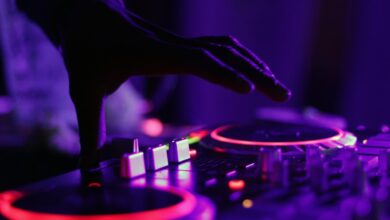Exploring the Impact of Music on Social Justice and Human Rights Advocacy

Have you ever stopped to think about the profound impact that music has on social justice and human rights advocacy? Music, with its universal language, has the incredible power to unite people from different backgrounds and inspire change. It acts as a catalyst for raising awareness, igniting conversations, and mobilizing communities towards a common cause.
When we delve into the realm of music, we discover a rich history of artists who have used their craft to advocate for social justice and human rights. From the soul-stirring songs of Bob Dylan during the civil rights movement to the powerful anthems of Nina Simone that echoed the struggle against racial inequality, music has been an integral part of various movements throughout history.

Music captures emotions in a way that words alone often cannot. It has the ability to evoke empathy, stir compassion, and ignite passion within us. Think about the iconic song “We Shall Overcome” that became the anthem of the Civil Rights Movement. Its simple yet poignant lyrics and uplifting melody resonated deeply with individuals fighting for equality, providing them with strength and hope during challenging times.
Furthermore, music has the remarkable ability to transcend cultural and linguistic barriers. It reaches deep into our souls, connecting us on a level beyond verbal communication. When we listen to a powerful protest song or a passionate ballad, we become part of something greater than ourselves. We feel a sense of solidarity, realizing that we are not alone in our quest for justice and equality.
In addition to its emotional impact, music also plays a practical role in social justice and human rights advocacy. Concerts and musical events often serve as platforms for activists to raise awareness and gather support for their causes. They create spaces where like-minded individuals can come together, share experiences, and discuss ways to effect meaningful change.

As we explore the impact of music on social justice and human rights advocacy, it becomes evident that music is more than just an art form. It is a powerful tool that has the potential to shape societies, challenge oppressive systems, and inspire a collective movement towards a better world. So, the next time you listen to a song or attend a concert, take a moment to reflect on the profound impact music can have in creating a more just and equitable society.
Harmonizing Humanity: How Music Serves as a Powerful Catalyst for Social Justice and Human Rights Advocacy
Introduction:
In a world where social justice and advocacy for human rights are crucial, music emerges as a powerful catalyst for change. It possesses the remarkable ability to transcend barriers of language, culture, and background, uniting people under a common purpose. Through its captivating melodies, heartfelt lyrics, and universal appeal, music has become an essential tool in the fight for equality and justice.
Music as an Emotional Connection:
One of the reasons music is so effective in advocacy is its profound ability to evoke emotions. A single song can stir compassion, outrage, or hope within us, compelling us to take action. As we listen to lyrics that express the struggles and triumphs of marginalized communities, our empathy is awakened, igniting a desire to make a positive difference. Music has a unique way of tapping into our shared humanity, inspiring us to stand up for what is right.
The Power of Collective Voice:
Music holds the power to bring people together like nothing else. It has the extraordinary ability to unite individuals from diverse backgrounds, fostering a sense of community and encouraging collective action. Whether it’s through protest songs, anthems of resilience, or empowering ballads, music creates a space where voices can harmonize, amplifying the call for social justice and human rights. It allows us to realize that we are not alone in our fight and that others share our struggles and aspirations.
Spreading Awareness:
Through its widespread popularity and reach, music serves as a potent medium for raising awareness about social issues. Artists leverage their platform to shed light on injustices, giving voice to those who have been silenced. Whether it’s through thought-provoking lyrics, captivating performances, or impactful music videos, musicians have the ability to spark conversations and challenge societal norms. Music serves as a conduit for educating, inspiring, and mobilizing listeners, creating a ripple effect that can lead to tangible change.
Music as a Call to Action:
Beyond raising awareness, music has the power to mobilize individuals to take action. Songs have historically been at the forefront of movements for civil rights, gender equality, and other social causes. They serve as anthems that embolden people to join protests, sign petitions, or support organizations advocating for human rights. Music transcends language barriers, enabling its message to resonate with people across borders and cultures, fostering global solidarity in the pursuit of justice.

Conclusion:
As we navigate the complexities of our world, music remains an unwavering force for social justice and human rights advocacy. Its unique ability to evoke emotions, unite communities, spread awareness, and spur action makes it an invaluable tool in the fight for equality and justice. By harnessing the transformative power of music, we can harmonize humanity and create a better world for all.
From Protest Songs to Global Movements: Unveiling the Transformative Power of Music in Activism
Introduction:
Have you ever wondered how a simple melody can ignite a flame within our hearts and inspire us to take action? Music has always had a profound impact on society, serving as a powerful medium for expressing emotions, spreading messages, and inciting change. From protest songs that echoed through historical movements to the digital age of global solidarity, the transformative power of music in activism remains undeniable.
The Evolution of Protest Songs:
Protest songs have long been the anthems of social change, resonating with the collective spirit of the masses. They capture the essence of struggle and serve as a unifying force, reminding us that we are not alone in our quest for justice. Throughout history, artists like Bob Dylan, Joan Baez, and Nina Simone used their voices and guitars as weapons against inequality, war, and discrimination. Their lyrics painted vivid pictures of systematic oppression, while melodies became rallying cries, fueling the flames of resistance.
Music as a Catalyst for Change:
Beyond its emotional impact, music possesses the unique ability to transcend borders and languages, creating bridges between people who share common aspirations. With the advent of social media and streaming platforms, music has transformed into a global language of activism. Today, an artist’s song can be heard instantly by millions across continents, amplifying the reach and impact of their message. From hashtags to viral challenges, music becomes the driving force behind movements, uniting individuals from diverse backgrounds, cultures, and generations.
Empowerment and Inspiration:
Music serves as a wellspring of empowerment, motivating individuals to stand up against injustice and fight for a better world. It instills hope, nourishes resilience, and ignites the fire of change in our souls. Just like a symphony blending different instruments to create harmony, music brings people together, fostering a sense of community and shared purpose. It has the power to evoke emotions, challenge societal norms, and inspire action at a level that mere words alone often cannot achieve.
Conclusion:
The Rhythm of Change: How Musicians Are Using Their Art to Drive Social Justice Reforms
Introduction:
Have you ever wondered how music, with its universal language, can transcend boundaries and ignite social change? Musicians have long recognized the power of their art to inspire, provoke thought, and foster unity among diverse communities. In this article, we delve into the captivating world where the rhythm of change resonates, exploring how musicians are using their creative platforms to drive social justice reforms.
The Melody of Empathy:
Music has an incredible ability to awaken empathy within us. Through poignant lyrics, soul-stirring melodies, and powerful performances, musicians tap into the core of human emotions, shedding light on societal issues that demand attention. They become the voices of the voiceless, amplifying the struggles faced by marginalized communities and advocating for equality. Just like a symphony, musicians harmonize their talents with a purpose, seeking to inspire action and bring about positive change.
Creating Cultural Conversations:
In their quest for social justice, musicians create cultural conversations that challenge the status quo. They invite dialogue on crucial topics such as racial inequality, gender discrimination, and political unrest. By weaving stories through their music, they break down barriers and encourage listeners to critically examine the world around them. Like a melody that lingers in our minds, their songs spark discussions, fostering understanding and empathy across diverse perspectives.
Unifying Communities Through Music:
Music has an inherent power to unite people from all walks of life. Musicians recognize this potential and utilize it as a catalyst for change. They organize benefit concerts, collaborate with artists from different backgrounds, and perform at rallies, leveraging the unifying force of music to bring diverse communities together. Through shared experiences and the unifying pulse of the rhythm, they build bridges and inspire collective action towards a more just society.

Breaking Barriers Beyond Borders:
In this interconnected world, music transcends geographical boundaries, allowing messages of social justice to resonate globally. Musicians are using technology and digital platforms to reach audiences across continents, creating a ripple effect that extends far beyond their immediate surroundings. Their music becomes an anthem for change, inspiring individuals worldwide to join in the pursuit of social justice reforms.
Conclusion:
The rhythm of change beats strongly as musicians employ their artistic talents to drive social justice reforms. Through the power of their music, they ignite empathy, foster cultural conversations, unite communities, and transcend borders. As listeners, we can be inspired by their melodies, letting them guide us on a path towards a more inclusive and equitable world. The harmonious fusion of music and social justice is a testament to the transformative potential of art in shaping a better future for all.
Melodies of Hope: Music’s Role in Amplifying Voices and Inspiring Action for Human Rights

Have you ever experienced the power of music? Imagine yourself at a concert, surrounded by thousands of people, all swaying to the rhythm, singing along with their favorite songs. In those moments, it feels like the music has the ability to transcend boundaries and bring people together. But did you know that music can also play a crucial role in amplifying voices and inspiring action for human rights?
Music has been a universal language since ancient times, speaking directly to our hearts and souls. It has the unique ability to convey emotions and tell stories in a way that words alone cannot. Through melodies and lyrics, musicians have the power to shed light on social injustices, challenge norms, and give a voice to the marginalized.
Throughout history, many influential artists have used their platform to advocate for human rights. Think about Bob Dylan’s iconic song “Blowin’ in the Wind,” which became an anthem for the civil rights movement in the 1960s. The powerful lyrics posed thought-provoking questions about equality and justice, inspiring millions to join the fight for change.
In recent years, we have witnessed a resurgence of music’s role in activism. Artists like Beyoncé, Kendrick Lamar, and Taylor Swift have fearlessly addressed various social issues, such as racial inequality, LGBTQ+ rights, and gender discrimination. Their songs have become catalysts for conversations and movements, igniting passion and inspiring action among their fans.
Moreover, music has the ability to create empathy and bridge gaps between different cultures and perspectives. When we listen to music from around the world, we are exposed to diverse narratives and gain a deeper understanding of the human experience. This exposure fosters compassion and encourages us to stand up for the rights and well-being of others, regardless of their background.
Music possesses a remarkable power to amplify voices and inspire action for human rights. It serves as a universal language that breaks barriers and unites people from all walks of life. Through their melodies, lyrics, and performances, musicians have the ability to shape public discourse, challenge societal norms, and ignite social change. So let us embrace the melodies of hope and use music as a force for good, empowering individuals and communities to strive for a more just and equal world.




